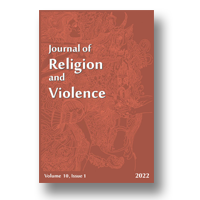|
articles |
|
1.
|
Journal of Religion and Violence:
Volume >
10 >
Issue: 1
Mia Bloom, Rachael Rollings
Introduction to the Special Issue: Losing My Religion: Evangelicalism and the Gospel of Q
view |
rights & permissions
| cited by
|
|
|
|
|
2.
|
Journal of Religion and Violence:
Volume >
10 >
Issue: 1
Jeremy D. Beauchamp
Evangelical Identity and QAnon:
Why Christians are Finding New Mission Fields in Political Conspiracy
abstract |
view |
rights & permissions
| cited by
The presidency of Donald Trump saw the rise of a new kind of conspiracy in QAnon. The internet-assembled meta-conspiracy has grown to include elements of other growing conspiracies such as the anti-mask movement and anti-vaxxers. As it has grown, QAnon has attracted significant support for its beliefs from white evangelicals who also supported Trump in huge numbers in both 2016 and 2020. In this integrative review of literature, I explore the reasons that QAnon has performed so well so quickly, finding justification for conspiracy theory support among evangelicals in the theory of cognitive dissonance. QAnon has found a foothold in evangelical circles during worldwide pandemic, which has left many evangelicals unmoored from their spiritual family and susceptible to other realms of community online. The conspiracy theory has infiltrated evangelicalism by using the language and concerns of Christianity in its messaging and by attempting to justify evangelical support of Donald Trump. Although traditional media are quick to point out the theory’s inconsistencies and failed prophecies, this paper finds that the harm QAnon has done to the evangelical community may only be undone through spiritual connection and practice.
|
|
|
|
|
3.
|
Journal of Religion and Violence:
Volume >
10 >
Issue: 1
Shuki J. Cohen
QAnon as an Online-Facilitated Cult:
Integrating Models of Belief, Practice, and Identity
abstract |
view |
rights & permissions
| cited by
Through the examination of QAnon as a religious apocalyptic “digital cult,” this paper integrates individual psychological models regarding the espousal of conspiracy beliefs with sociological and anthropological models of religious cultism, particularly in the context of destructive and violent cults. This integrative model purports to reconcile the apparent contradiction between the extravagant irrationality of the QAnon belief-system with the otherwise normative demographics of its adherents and distinguish—as scholars of religion often do—between the creed, the practice, and the social identity aspects of the movement. Cultic studies (adapted to the digital age) are leveraged to discern the functions that different strata of adherents provide to the movement, and elucidate the mechanisms by which they coexist, collaborate, and avoid splitting along organizational or ideological fault-lines. The model also draws upon studies of apocalyptic cults and violent radicalization to caution against counter-productive over-generalization, over-sensationalizing, and over-pathologizing of QAnon believers.
|
|
|
|
|
4.
|
Journal of Religion and Violence:
Volume >
10 >
Issue: 1
Julie Ingersoll
America’s Holy Trinity: How Conspiracism, Apocalypticism, and Persecution Narratives Set Us up for Crisis
abstract |
view |
rights & permissions
| cited by
Debates over whether QAnon is a “religion” or a “cult” lack theoretical grounding; they depend on unacknowledged definitions and classificatory schemes and ultimately don’t prove useful as an analytical framework for sociological/historical scholarship. Instead, this article suggests we explore the ways one contemporary religious movement helped make widespread acceptance of QAnon possible by weaving their theological commitments to apocalypticism, conspiracies and persecution narratives into the larger American culture.
|
|
|
|
|
5.
|
Journal of Religion and Violence:
Volume >
10 >
Issue: 1
Mark Juergensmeyer
QAnon as Religious Terrorism
abstract |
view |
rights & permissions
| cited by
While the horrific scenes of the invasion and occupation of the US Capitol building played out on television, I happened to be doing a radio interview for my recent book on religious terrorism (Juergensmeyer 2020). The reporter asked if there were similarities between the Trump-incited rioters and the terrorists I have studied. I quickly responded “yes.” It is true that the reasons for religious-inspired insurrections around the world are specific to their contexts—supporters of al Qaeda are not the same as militant Buddhists in Myanmar. Yet there are some striking similarities among the cosmic battles imagined in the apocalyptic scenarios that propel movements of religious of religious violence. This includes ISIS, Christian militia groups, Jewish extremists, and Hindu and Sikh militants. They all bear some common characteristics, and QAnon shares many similarities with them. To begin with, QAnon bears some relationship to religion. To be sure, the conspiracy theory at the heart of QAnon belief is this-worldly. It includes the notion that there is a secret design among liberal politicians and media figures to take over the world for their evil purposes, among which is ritual leeching the blood of innocent children for empowerment.
|
|
|
|





